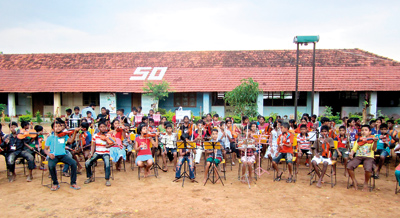Mozart comes to Mullaitivu
On August 26, four busloads of children from three schools in Kurunegala travelled to Thunukkai in Mullaitivu to join the children of the north for a four-day long residential workshop as they prepared to work yet again as an orchestra. The children have worked together on three residential programmes over three years and so were seeing their partners in the programme yet again.
The children of Kurunegala stayed at Yohapuram Maha Vidyalayam, Thunukkai for the UNITE programme for 2013 which was sponsored by JICA Sri Lanka. Nearly 250 children of the 500 children on the programme gathered together in the farming hamlet of Thunukkai, which was a hive of activity.

Growing through music: The children at the Thunukkai workshop
The children are members of The Music Project, a programme dedicated to improving the lives of children through music. The project is inspired by El Sistema of Venezeula which has nearly 130 orchestras throughout Venezuela and over 300,000 children learning music to build orchestral communities.
The successes of El Sistema are world renowned, with their flagship orchestra The Simon Bolivar Orchestra performing at Carnegie Hall, London’s Albert Hall and the BBC Proms, under the baton of their most celebrated home-grown conductor, Gustav Dudamel. Similar projects have commenced in the UK inspired and guided by El Sistema and under the tutelage of Julian Lloyd Webber.
The UK project, In Harmony reports other successes beyond music. In 2008 – before In Harmony – only 35 per cent of children at the school were achieving the required level of literacy. By 2010 – less than two years after In Harmony began there – that figure had jumped to more than 80 per cent, with a similar improvement also recorded in pupil’s numeracy. To quote from its 2012 Ofsted report: “It is very clear that participation in the ‘In Harmony’ programme has a much wider benefit for the pupils’ personal and social development, as well as for their general educational attainment. While recognising the school’s good fortune in being involved with the ‘In Harmony’ project, parents and staff speak passionately about the way that involvement in music has changed children’s attitudes and expectations. As one parent said, ‘music has given our children respect for themselves, respect for each other, and respect for education”.
The project in Sri Lanka has parents report that the children have gained in self-esteem, confidence and motivation from their performances at The British School in Colombo, the Jaffna Music Festival and most recently on the BBC documentary Sri Lanka’s Open Wounds. In addition to providing long term partnerships and links between the communities of the north and south, the programme works towards social cohesion and understanding. The children of the programme work alongside each other in sectional rehearsals, adopt peer teaching techniques where language barriers are overcome by music, and function on creative initiatives such as improvising and learning about their respective cultures.
The children sing in English, Sinhala and Tamil to develop an understanding of pitch, tone and harmony. The methodology of instruction is Suzuki for its proven track record of success, which is based on the mother tongue approach to learning music. Just as much as a child absorbs, assimilates and acquires fluency in their mother tongue without formal instruction and where reading comes after verbal mastery, with the project too, children are immersed in music, exposed to many genres and are taught mastery of the instrument prior to sight reading of notation. The confidence gained through this approach motivates them to aspire to challenges and aspiration within music with each child progressing at their own pace.
The four day long intense programme saw the children progress through sectional rehearsals, hone their skills of music theory, learn about composers as the grouping of children were assigned by the names of composers and also experience specialist teaching. As rhythm and pulse are key to an understanding of music, they had a drum workshop by Drum House to develop their skills of rhythm.
Sometimes referred to as “passion first/refinement second”, the El Sistema methodology is in marked contrast to traditional methods of instruction.
The Music Project, much like, El Sistema fosters a sense of achievement on an individual and personal level and gives those whose lives might have been blighted by poverty, a therapeutic and holistic opportunity to excel and fulfil their own potential within a thriving musical community.
The key to success of projects such as these inspired by El Sistema – is that it is not just another music project: it is a social project with music at its heart. At the final workshop an orchestra of 250 children performed Ode to Joy and the Twinkle variations by Mozart. This is a project to be watched with interest as the children grow through music and exposure, and demonstrate that with expert guidance and initiative that the mastery of a musical instrument is an option for anyone, irrespective of their social background.
The children have learnt through hard work, perseverance and the proper holistic intervention, that music is achievable and possible. For the children of these two farming communities of Kurunegala and Mullaitivu the musical journey will be challenging but fulfilling and they will inherit a life skill as well as a strong sense of community through The Music Project.
See www.musicprojectsl.com
comments powered by Disqus

